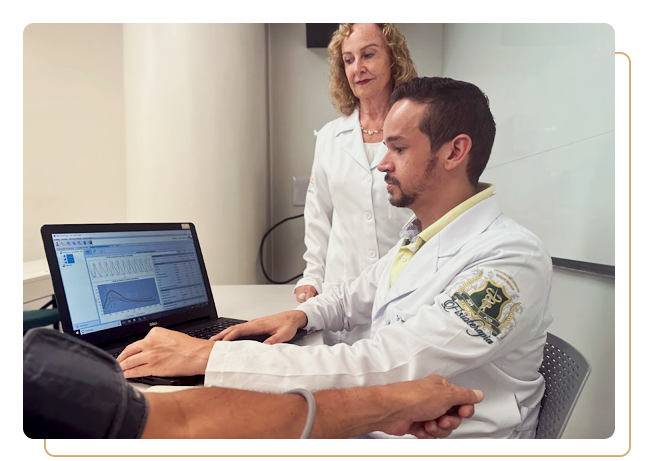
Cardiovascular Diseases Sciences Applied
Study the epidemiological, molecular, genetic, pathophysiological, propaedeutic, and therapeutic processes involving cardiac and vascular diseases.
Evaluation of innovative diagnostic and prognostic tools for various cardiovascular diseases. Study of rehabilitation and health management protocols related to the cardiovascular system.

Research Axes
Check out the Axes:
- Axis: Education applied to cancer
- Assessment of knowledge about different types of cancer among the academic community (elementary, secondary, and higher education), primary care professionals, caregivers, and the community in general.
- Development of tools and processes for disseminating knowledge about cancer that can impact society.
- Axis: Impact of diagnosis and treatment on cancer patients
- Assessment of cancer treatments and their outcomes, toxicities, and patient quality of life.
- Assessment of the biopsychosocial impact related to cancer diagnosis and treatment.
- Axis: Strategic management of health care for oncology
- Assessment of the effectiveness and implementation of public policies related to oncology
- Assessment of the flow of cancer patients in the SUS and in Supplementary Health, including health disparities related to access to technologies, as well as the costs related to the different treatments available.
- Axis: Head and neck cancer
- Assessment of the side effects of therapy and the outcome of clinical interventions in cancer patients, especially those with head and neck cancer. This line covers both studies that use databases and cross-sectional and longitudinal studies involving cancer diagnosis and treatment.
- Genitourinary tumors
- Assessment of epidemiological aspects, diagnosis, treatment, and molecular biology.
- Uro-oncological surgery.
- Axis: Onco-Hematology
- Study of histocompatibility and immunogenetics in donor selection, the main indications, and the main outcomes observed after autologous or allogeneic hematopoietic stem cell transplantation.
- Axis: Surgical and molecular pathology of human neoplasms
- Investigation of molecular methods complementary to surgical pathology for the diagnosis and staging of human neoplasms.
- Axis: Biomarkers of human neoplasms
- Molecular characterization of human neoplasms aimed at identifying diagnostic and prognostic biomarkers.
- Application of molecular biology techniques as auxiliary tools for diagnosis and decision-making in oncology clinical practice.
- Axis: Lymphomagenesis
- Understanding the genetic, epigenetic, and microenvironmental alterations of human lymphomas.
- Evaluation of the response to immunotherapies and identification of molecular targets with therapeutic potential.
- Axle: Evaluation of macrovascular complications in patients with diabetes mellitus undergoing real replacement therapy and hospitalized
1. The proposal of this line is to evaluate markers of macrovascular disease, oxidative stress and indicators of cardiac failure in patients with diabetes on renal replacement therapy, due to their high cardiovascular mortality.
Faculty

• Evaluation of macrovascular complications in patients with diabetes mellitus undergoing real replacement therapy and hospitalized
• Role of adipocytokines in ovarian steroidogenesis
• In-hospital prognostic factors and mortality in chronic diseases
- fabio.comim@cienciasmedicasmg.edu.br

• Environmental contamination and cardiac repercussions
• Pathogenesis and management of cardiac emergencies applied to preclinical studies
• Realistic simulation and artificial intelligence
- julliane.santos@cienciasmedicasmg.edu.br

• Head and neck cancer
• Vascular modulation
• Physiological impacts of sleep-related breathing disorders
- bruno.rezende@cienciasmedicasmg.edu.br

• Biomarkers in cardiovascular health
• • Arterial hypertension, diabetes mellitus, risk factors for vascular aging
- marcus.malachias@cienciasmedicasmg.edu.br

• Involvement of the renin-angiotensin system (RAS) in the pathophysiology and treatment of respiratory diseases
• Vascular health
- maria.machado@cienciasmedicasmg.edu.br
Other Lines of Research
Selection process
The selection process for the stricto sensu graduation program at the Faculdade Ciências Médicas de Minas Gerais is structured to identify candidates with solid academic backgrounds and the potential to contribute to scientific production and innovation in the health sector.
Our commitment is to ensure a transparent and rigorous process, valuing professionals who wish to further their studies and develop research aligned with the demands of the sector.
The selection process follows institutional guidelines and CAPES references, ensuring a nationally recognized quality standard.
Admission methods are available for the 1st and 2nd semesters
Questions? Get in touch!
Check the notices

